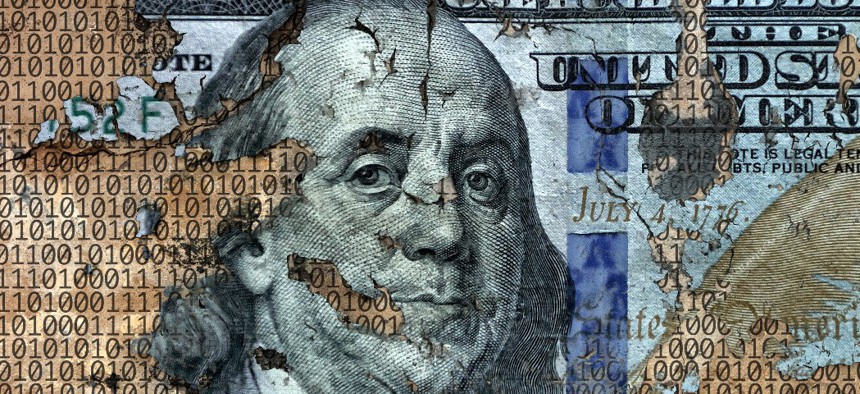Russian Aggression Hastens Lawmakers' Push to Enforce Sanctions in Crypto Industry

Sadik Demiroz/Getty Images
The Justice Department also launched a ‘KleptoCapture’ task force to target the use of cryptocurrencies for sanctions evasion.
Sen. Elizabeth Warren, D-Mass., and the chairmen of three key committees, are worried about the Treasury Department’s ability to enforce new sanctions against Russia, given reports the Kremlin is planning to evade them by increasing its activities in the cryptocurrency industry.
“We are concerned that [the Office of Foreign Assets Control] has not developed sufficiently strong and effective procedures for enforcement in the cryptocurrency industry,” reads a letter Warren sent to Treasury Secretary Janet Yellen Wednesday along with Intelligence Committee Chair Mark Warner, D-Va., Banking Committee Chair Sherrod Brown, D-Ohio, and Armed Services Committee Chair Jack Reed, D-R.I.
The recent sanctions are the main U.S. response to Russia’s attack on Ukrainian autonomy, but could end up having minimal effect, especially given the department’s reliance on “voluntary self-disclosure from sanctions violators for enforcement,” the senators said. Indeed 67% of the Trump administration’s enforcement efforts in this area came from self-disclosures, according to a report cited in their letter.
“This model appears to be particularly ill-suited for enforcing sanctions compliance in the cryptocurrency industry given the prevalence of pseudonymity and the current weakness of the industry’s compliance programs,” the senators wrote, noting, “These concerns have become even more urgent given the sanctions imposed on Russia after its invasion of Ukraine and reports that ‘Russian entities are preparing to blunt some of the worst effects’ of the sanctions that have been levied on the country by using the array of ‘cryptocurrency-related tools as its disposal.’”
The letter points to various ways sanctioned regimes such as Iran and North Korea have been able to use the cryptocurrency industry to reduce the impact of U.S. sanctions and flags the possible return of ransomware attacks to fund Russian operations in the absence of access to the centralized global financial infrastructure.
“There are growing concerns that Russia may use cryptocurrencies to circumvent the broad new sanctions it faces from the Biden administration and foreign governments in response to its invasion of Ukraine,” the senators wrote. “This could include the use of dark web marketplaces that are powered by cryptocurrencies to move funds and conduct transactions; the use of crypto wallets and mixing services that allow sanctioned entities to transfer and hide their wealth; deployment of a digital ruble that would allow Russia to conduct foreign trade without converting their currency into dollars; and ransomware attacks that would allow Russian actors to recoup revenues lost to sanctions.”
Fear of authoritarian regimes using digital currencies to escape sanctions as a reliable non-military whip is bi-partisan. But it’s complicated. Lawmakers want the U.S. to compete in the crypto space, not just crush it.
“Imagine right now if Russia had its own digital currency,” Rep. Mike McCaul, R-Texas, ranking member of the House Foreign Affairs Committee and co-chair of the congressional internet caucus, said Monday at the annual State of the Net conference. “Would these sanctions have any impact?”
“It's going to happen, just like the internet happened … and what would be the ramifications of countries having their own digital currency, because I think that is going to be the way of the future,” he said. "And I argue the United States has to lead, and we need to set the rules of the road on this and we need to start working on our own digital currency.”
Sen. Warner, is also sensitive to the industry’s appeals in this regard. He’s signed onto another letter several Republican senators joined in sending to Yellen in December recognizing challenges that might exist for crypto miners and other stakeholders outside of cryptocurrency exchanges to comply with know-your-customer requirements that exist for banks and other financial institutions.
The senators’ letter Wednesday comes just as the Justice Department also launched “an interagency law enforcement task force dedicated to enforcing the sweeping sanctions, export restrictions and economic countermeasures that the United States has imposed, along with allies and partners, in response to Russia’s unprovoked military invasion of Ukraine.”
The Justice-led task force—called KleptoCapture—will include a focus on “combating unlawful efforts to undermine restrictions taken against Russian financial institutions, including the prosecution of those who try to evade know-your-customer and anti-money laundering measures; [and] targeting efforts to use cryptocurrency to evade U.S. sanctions, launder proceeds of foreign corruption or evade U.S. responses to Russian military aggression.”






